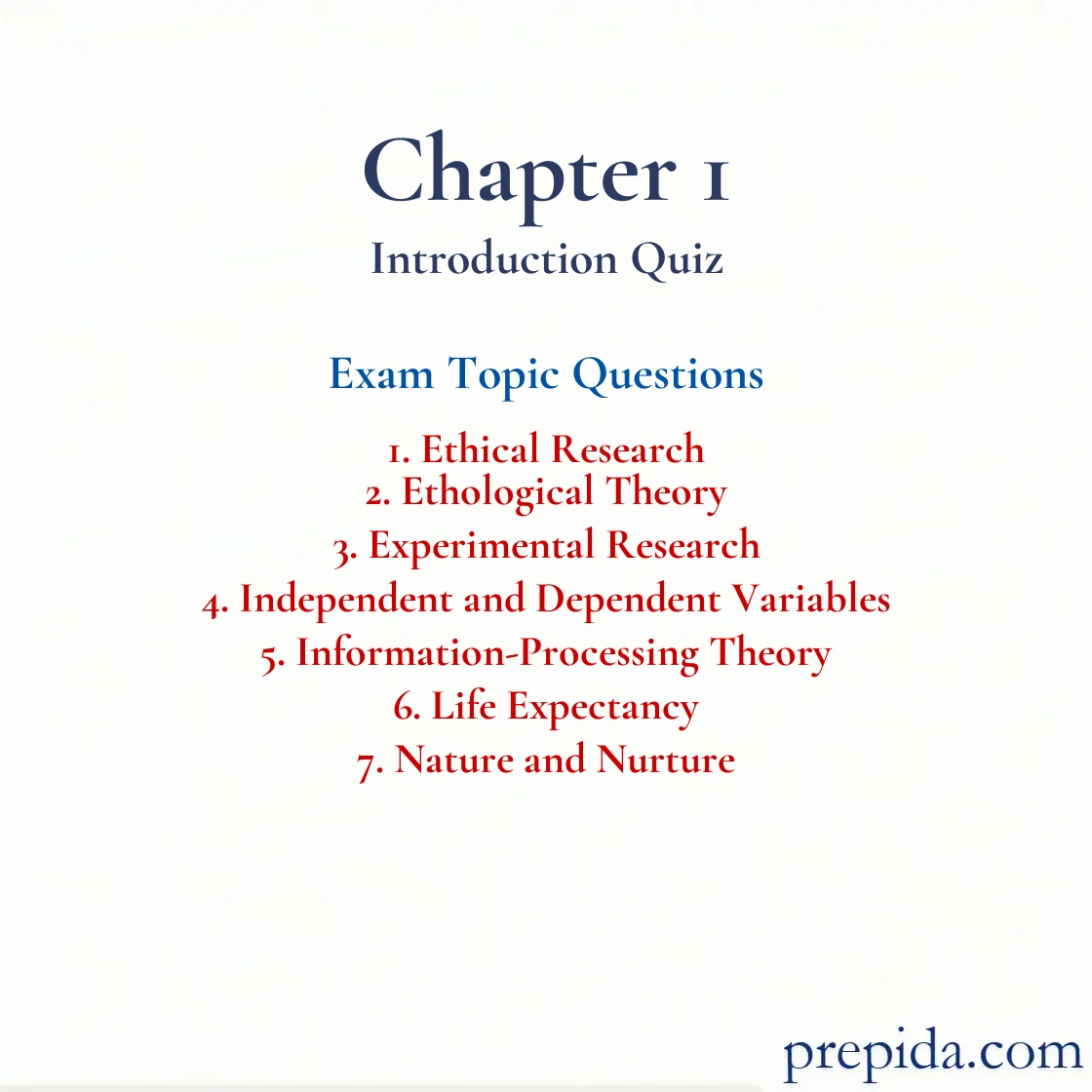
According to APA's guidelines, all participants must know what their research participation will involve and what risks might develop. This guideline addresses which of the following issues?
- deception
- debriefing
- informed consent
- confidentiality
Fernando believes that the presence or absence of certain experiences in life has a long-lasting influence on individuals. He further believes that there is rapid, innate learning that involves attachment to the first moving object seen and that this learning takes place at a critical period very early in the life of an animal. In this scenario, Fernando is most likely taking a(n) ________ approach to human development.
- behavioral
- ethological
- social cognitive
- psychoanalytic
Ethology: Stresses that behavior is strongly influenced by biology, is tied to evolution, and is characterized by critical or sensitive periods.
In Lorenz's view, imprinting needs to take place at a certain, very early time in the life of the animal, or else it will not take place. This period of time is called the
- receptive period.
- sensitive period.
- critical period.
- bonding period.
Fetal Period: Lasting about seven months, the prenatal period between two months after conception and birth in typical pregnancies.
Konrad Lorenz performed research with goslings and found that many, upon hatching, identified him as their mother. He called this form of attachment
- conditioning.
- imprinting.
- internalizing.
- acclimatizing.
Coparenting: Support parents provide for each other in jointly raising their children.
A recent television documentary concluded that, from birth, girls are more nurturing than are boys. Daniel agrees with this because he believes nurturing is an evolutionary trait passed on through the generations, because females needed to be more nurturing to aid the survival of the species. Daniel's view reflects the ________ perspective of development.
- ideological
- clinical
- ethological
- theological
Ethology: Stresses that behavior is strongly influenced by biology, is tied to evolution, and is characterized by critical or sensitive periods.
Human infants go through an attachment period. John Bowlby calls this a ________ period, meaning that for optimal development attachment should occur during this period.
- positive
- critical
- sensitive
- severe attachment
Sensation: The product of the interaction between information and the sensory receptors—the eyes, ears, tongue, nostrils, and skin.
In an experimental study, the ________ group serves as a baseline against which the effects of the manipulated condition can be compared.
- control
- experimental
- dependent
- independent
Experiment: A carefully regulated procedure in which one or more of the factors believed to influence the behavior being studied are manipulated while all other factors are held constant.
A(n) ________ is a carefully regulated procedure in which one or more factors believed to influence the behavior being studied are manipulated while all other factors are held constant.
- case study
- survey
- experiment
- correlation
Experiment: A carefully regulated procedure in which one or more of the factors believed to influence the behavior being studied are manipulated while all other factors are held constant.
A researcher is interested in the effect of exercise on stamina in elderly patients. The patients are randomly assigned to be in a high-exercise or low-exercise training program for eight weeks. At the end of the program, their stamina is measured by seeing how long they can walk comfortably on a treadmill. In this study, the dependent variable is
- the number of minutes on the treadmill.
- the exercise program (high versus low).
- the number of elderly patients.
- the eight-week duration of the exercise program.
Aerobic Exercise: Sustained exercise (such as jogging, swimming, or cycling) that stimulates heart and lung activity.
A characteristic feature of information-processing psychologists is that they are most likely to
- emphasize the influence of culture on development.
- emphasize that individuals manipulate information, monitor it, and strategize about it.
- state that individuals develop a gradually decreasing capacity for processing information.
- state that thinking does not constitute information processing.
Information-Processing Theory: Emphasizes that individuals manipulate information, monitor it, and strategize about it. Central to this theory are the processes of memory and thinking.
The life expectancy in the United States is currently
- 60 years.
- 79 years.
- 85 years
- 53 years.
Life Expectancy: The number of years that will probably be lived by the average person born in a particular year.
In the context of Laura Carstensen's view on life expectancy, which of the following statements is true?
- There has been a remarkable decrease in the number of people living to an old age.
- The conception of work as a full-time endeavor ending in the early 60s is well suited for long lives.
- Science, technology, and social expectations have not kept pace with the increase in the number of people living to an old age.
- There should be a change from a world constructed mainly for the elderly to a world that is more compatible for young people.
Life Expectancy: The number of years that will probably be lived by the average person born in a particular year.
Which of the following is true of life expectancy in the United States?
- It decreased by 15 years in the beginning of the 21st century.
- It has remained unaffected by improvements in sanitation and nutrition.
- It increased by 32 years in the 20th century.
- It has remained unpredictable and has confused demographers.
Life Expectancy: The number of years that will probably be lived by the average person born in a particular year.
In the nature-nurture issue, nature refers to an organism's ________, nurture to its ________.
- personality traits; abilities
- attributes; ecological heritage
- biological inheritance; environmental experiences
- acquired traits; heredity
Nature-Nurture Issue: Debate about whether development is primarily influenced by nature or nurture. Nature refers to an organism’s biological inheritance, nurture to its environmental experiences.